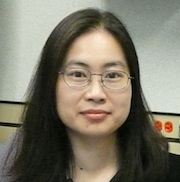Wendy Young
The Patent Examiner
Canadian Intellectual Property Office (CIPO)
Industry Canada, Gatineau, QC

Education
B.Sc. (Hons, Combined Biology and Chemistry), University of British Columbia, 1995
M.Sc. (Chemistry), ║┌┴╧│╘╣╧═Ї, 2005
Career Path
After my B.Sc. at UBC, I worked in a university research lab and also took more courses in biology, chemistry, plant genetics and virology. I subsequently became an Analytical Chemist at the Drug Analysis Lab at Health Canada in Burnaby, BC, and analyzed samples submitted by the RCMP and local police forces. I became an inspector with the Product Safety Program and then returned to the lab as the Internal Auditor. After completing an M.Sc. at ║┌┴╧│╘╣╧═Ї I spent time learning money management and investment skills. After several interviews from different departments within the Federal Government, each pertaining to different knowledge and skills that I possessed, I accepted an offer from CIPO because this position appeared to be the most challenging and rewarding. In my present job as a Patent Examiner, I first went through intensive training in the classroom and on the job, e.g., Act and Rules, jurisprudence and how to examine applications. I have been promoted twice since joining the office in September 2006. In March 2009, I was recommended by my boss to help teach new examiners, and I was chosen to be in the Internal Audit team of the Patent Branch. My responsibilities also include examining applications in different disciplines and communicating with patent agents, who are lawyers with graduate degrees (usually Ph.D.тАЩs) in science. I have been able to travel to one conference each year, and have also spent a lot of my own time learning about jurisprudence (court decisions in patents) and different disciplines in chemistry to further my knowledge and to be competent in the subject that I am examining. When needed, I help other examiners with patent documents or journal articles written in Chinese and Japanese.
Chemistry in Action
Having a chemistry degree has allowed me to develop an inquisitive and objective mind where I analyze data and facts objectively and with reasoning, rather than emotionally. Moreover, the preciseness that is required of chemists in labs has allowed me to be thorough and precise in all areas of my work and interests, from being a bench chemist, to managing investments and finances, and now, in an office where I examine applications. I have heard many times, and can attest myself, that it is much easier for a chemist to learn and master other subjects, from business to science, from new languages (I have had to do that myself!) to law, than the reverse.
Last Words
I sincerely hope you will seriously consider pursuing a major or, better, an honours, degree in chemistry! ║┌┴╧│╘╣╧═Їis an excellent place to start the journey of becoming a future chemist. Cultivate a sense of curiosity to understand тАЬthe central scienceтАЭ which links so many disciplines. The transferable skills, preciseness, and analytical thinking skills one possesses after having studied for a chemistry degree are of immense benefit тАУ regardless of what occupation one ends up working in. Finally, do not ever give up or be deterred by set-backs and difficulties in the journey of choosing, and after choosing, to major in chemistry: the synthetic schemes may look scary, the crystallizations may not always workтАжbut in the end, тАЬdigging deeperтАЭ to overcome the challenges will give one the persistence to handle all sorts of problems in life.
